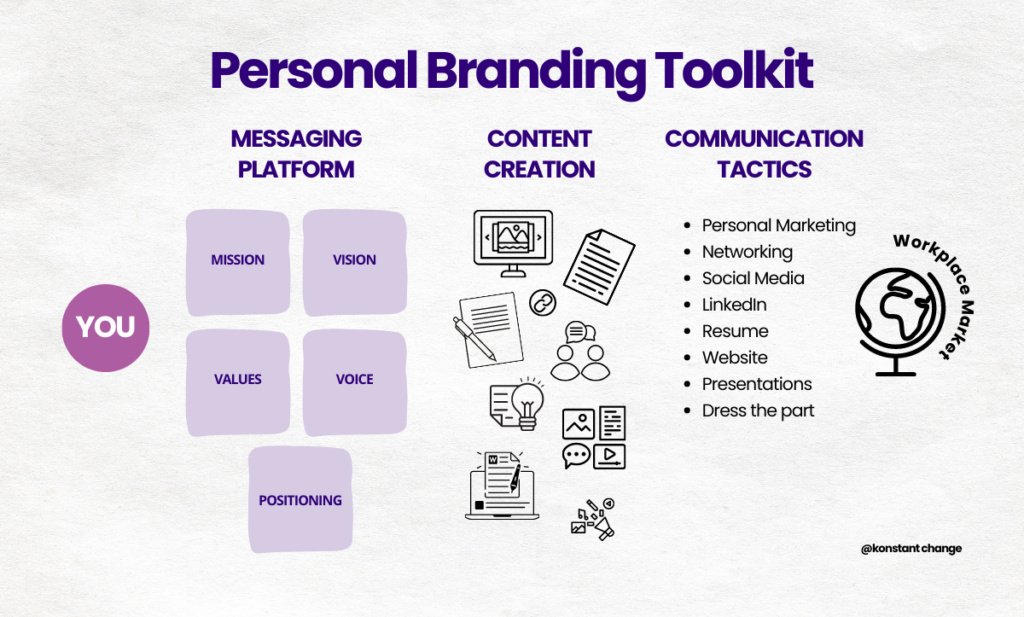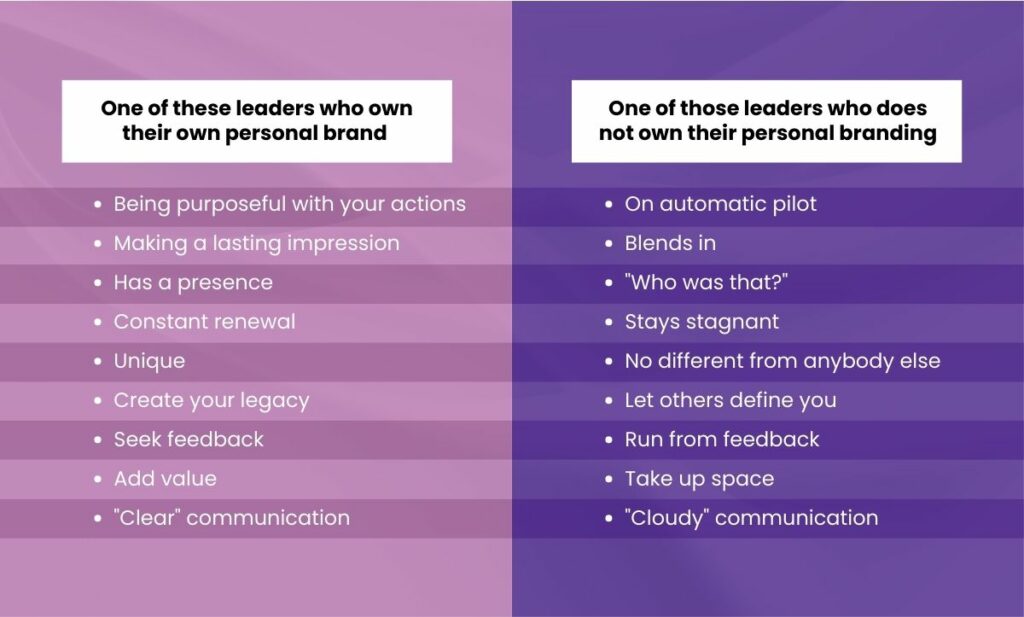
Why is leadership personal branding important within your organisation?
Do you know Warren Buffet, Ariana Huffington, Elon Musk, or Richard Branson? Of course, you do! They have a net worth of billions, and their companies are premier organisations. But is that the only reason you feel connected to them?
Their personal brand allowed them to step into the public eye. They share wisdom, leadership principles, vision, and leadership secrets. Their brands acquired texture, character, and public sentiments that helped them connect with the masses and grab opportunities that weren’t possible.
This shows that whether you are a CEO, holding a leadership position, or have just started your career, believing that “My work will speak for me” won’t be beneficial anymore. The pandemic changed “business models” and “how businesses are done.” And since everyone focuses on building transparency, relationships and communities, it’s high time you get on the train to create an influence.
As we mentioned before, leaders aren’t immune to the evolving digital ecosystem. So, solidifying their brand and reputation is becoming a prerequisite. A leader who develops a personal brand becomes someone that everyone trusts.
If you are wondering why it is even crucial for your leaders, here’s one statement you must ponder.
“A leadership brand conveys your identity and distinctiveness as a leader. It communicates the value you offer.” ~ Norm Smallwood, HBR. In simple terms, it creates awareness about who you are, what you stand for, and why people should follow you. If your brand reflects that you make a positive difference, it will produce outstanding results.
In this article, we will delve deeper into gaining an understanding of how personal branding is beneficial for leaders and corporates.
Let’s begin with this question…
What is your personal brand?
Look at your career path. You are aware that your leadership footprint isn’t made of sand. It is solid that creates impact. Finding your voice as a leader helps you communicate your overall expression. That’s how having a personal brand helps you.
Many studies confirm that leaders must build a leadership brand. It will help you separate yourself from the leaders who don’t have any impact. This will help you cut through the clutter and focus all your energy on things that matter.
For example, the pandemic forced everyone to work from home. But the leaders who showed initiative and communicated what mattered, their vision, and future possibilities connected well with their team members. Let’s not forget that “Leadership isn’t about leading within a workspace. It’s about making a difference and maximising your leadership potential by showing what you have achieved and will pursue in these vulnerable times.”
In a flurry of corporate restructuring and rethinking, it’s time your leaders know:
- Who are they?
- What do they do?
- What do they desire to accomplish?
When leaders know exactly how to support people, they become a part of the success, even if the ground feels shaky. Digital transformation will stay, and if you want to harness the positive benefits, it’s time to increase the value of your leaders, which will improve employer and corporate brands.
Also read: What Personal Branding is not about…
But how to begin?
Collaborate with personal, employer, and corporate brands together
Collaboration is the key. It will help you yield more noticeable and significant success as a brand. This is why you must encourage your leaders to develop a personal brand that, when combined with your brand’s branding, derives better results. It will expand your worth when combined with smart personal brands.

Source: LinkedIn
This is what three different brands within a workplace look like:
While they might look like they have different goals, their overlapping vision and audiences make it a unique combination to navigate the challenges of the “future of work.”
But to achieve that, the first step is to understand the personal branding of a leader…
Personal branding of a leader
- What is your leader known for?
- What does the leader represent?
- What does your leader stand for?
To find that voice as a leader, your leaders must understand their values, use their influence, and wrap it up into content that opens a door for opportunities. It’s all about how they build a personal brand as a leader that becomes a stellar communicator.
But your leaders need to understand how to create “personal branding.” Let’s begin with the basics.
- It isn’t all about you: If you think personal branding is talking about yourself, it is quite the opposite. It’s about the relationships with your clients, customers, colleagues, team, and community. It’s about the message you share connecting you with many people within and outside your organisation.
- It’s about expressing confidence: Communication is important in building a solid presence. But if you exclude expressions like writing and listening skills, you can’t connect to a larger audience. Personal branding allows you to do just that. It will sharpen your ability to express yourself and make you project yourself as the leader you are.
The idea is to discover what type of leader you have. That’s how your leaders will be able to fit into your brand of leadership. If you still feel it will be a waste of time for your leaders to develop one, here’s the distinction you must consider.

Not only that, but here’s what your leaders can create when building a personal brand:
- My personal brand will reflect that I am open to communication and that I am eager to learn inputs and feedback.
- My personal brand will instil confidence and will, inspire my audience and will reflect my values, outcomes, and influence.
- My personal brand will show my legacy, my vision, and how I take steps to make things a reality.
- My personal brand will share my personality and how I behave in nerve-wracking situations.
Your leader’s personal brand will act like their footprint that will help them leave a mark on others. It will impact them, their organisation, and their business bottom line. The same will help you:
- Discover your critical leadership values.
- Create a compelling vision to achieve the outcomes you need.
- Influence the relationships by building trust and credibility.
Personal Branding for aspiring leaders
While everyone is talking about leadership roles to build a personal brand, it is equally important that your potential leaders should do it as well. If your employees have the capability and want to make it approachable, paying attention to their personnel will help them ascend to higher roles.
This is how the organisational leaders will find the personality, mindset, and the next big players that will keep the succession pipeline alive. In today’s time, organisations must understand that only working behind the scenes won’t help you advance them into leadership roles. The more intelligent brands within your organisation across all levels, your business and revenue will increase.
If organisations feel that solid personal brands can result in turnover, here are some reasons you must push your employees to have a personal brand.
Also read: Personal Branding Strategy: A Roadmap for professionals, experts, and executives
Why should organisations push leaders to have a personal brand?
- Leaders who promote personal branding indirectly help with employer organisation: If you have a leader talking about your company, initiatives, and how he is a part of the initiative, it will not only reinforce his capabilities but will also protect your brand in a positive light. It will strengthen your corporate brand and help you attract potential employees who are in the audience. It’s a solid win for all types of branding. Remember, trends and breakthroughs discovered through such star performers or leaders will stimulate corporate innovation and the bottom line.
- Leaders who are open to personal branding attract talent: When your potential leaders and individuals in leadership roles will start sharing insights into operations, culture, and initiatives, it will act as employer branding, which will attract talent towards your company. Such content forms start acting as information nuggets, enabling job candidates to approach their target employer positively.
- Leaders who endorse personal branding are seen positively: Everyone knows that personal growth is important to individuals. And if leaders talk openly about personal branding, development, career progression, advancing into leadership roles, and organisational initiatives. They will feel satisfied and happier since you endorse the practice that constructive information will always be available for them, and they can work on their personal growth alongside the organisational growth. Hence, it will reduce employee turnover and increase employee satisfaction and productivity.
- The management will have a clear idea of “Who’s who”: A lot of times, your teams cannot talk openly about their aspirations, goals, and ambitions. Whether it will align with your vision you keep wondering. However, with personal branding, you will better understand the capabilities of workers across an organisation. You will request a team member based on their interests instead of sending out the robotic job descriptions.
- Leaders/ employees who publish amplify your marketing or recruitment efforts: Employees who are prolific publishers will help you reflect your brand’s ideals, values, and vision. Whether they post blogs, technical briefs, videos, or their personal thought process, it will enhance your marketing efforts. Your leaders and employees will act as a digital footprint that will bridge the gap between candidates and people working within the company.
- Leaders with a strong personal brand will attract new business: Everyone wants to attract new business. But it gets overwhelming for brands when they take the usual marketing route. With strong personal brands online, organisations can leverage their network and position their brand as agile and forward-thinking.
Let’s review a few personal brands that reflect positive personal, corporate, and employer brands.
There are many examples of leaders who mastered brand integration with their personal brands. Here are the examples:
- Richard Branson: He is the leader of Virgin Group. His brand is synonymous with attributes like: anything is possible, risk-taking, innovation, or Think Big.
- Mona Kiblawi Charif is the CMO at NTT DATA Services, who offers a masterclass. Her personal brand shows her dedication to clients, and topics like STEM, her sense of humour.
- Anjali Sud, CEO of Vimeo, uses her personal brand to connect her personal brand with a professional brand statement. She walks through all the aspects of her life and backs them with research, action, and execution.
- Carla Pineyro Sublett, CMO at IBM, often shares stories of her career responsibilities while focusing on things that make a difference in her and others’ lives. She highlights the aspects of life that are important to her, and this builds trust.
What next?
We can help your leaders manage the constant changes brought by new technologies with standalone or group leadership personal branding strategies that will allow them to stay with time, attract trust, build credibility, and boost your brand.
